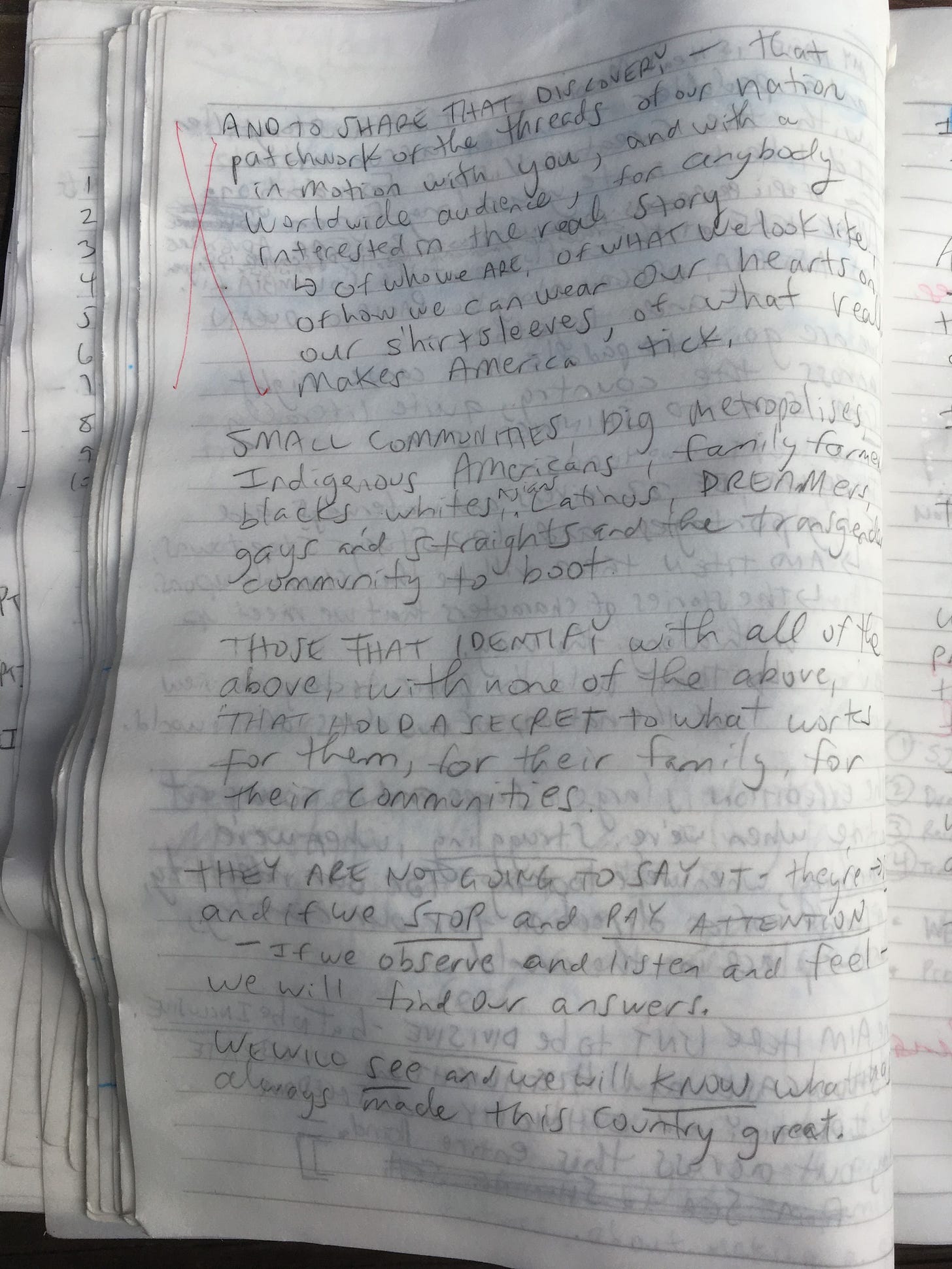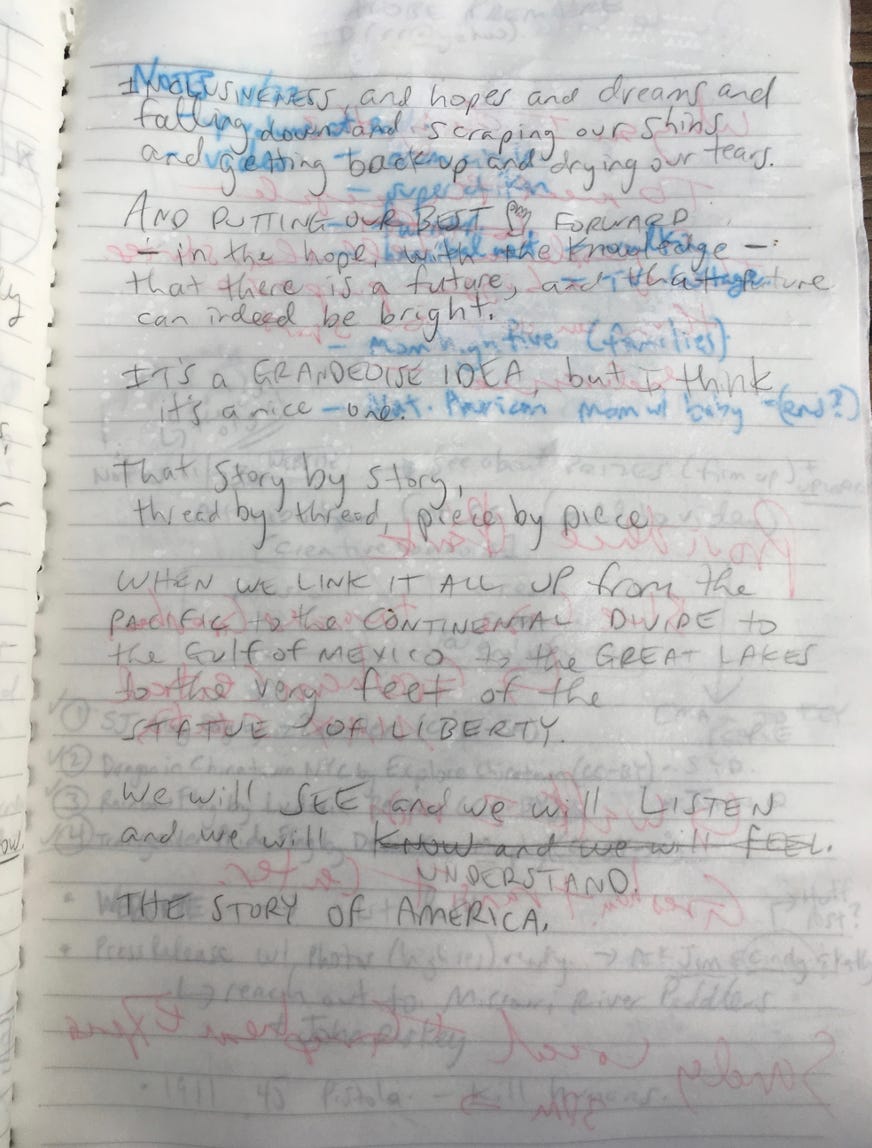
Hello friends,
They all submerged into the glacial St. Regis River in Western Montana – the map, the expedition mission statement, the early journal entries of my first 2018 cross-continent canoe expedition attempt. Once dragged into and under the current in an old Duluth canoe pack, they’d eventually be returned weeks later by a fly-fishing Montana-based father-daughter duo. I’d chronicle the map and journal entries photographically in their waterlogged state while resupplying in the university town of Missoula (in case they disappeared again – which they did). Shuffling through the hands of a myriad of friends who were gracious enough to hold onto them a spell, they were eventually lost.

It was June 11, 2018, and a bend in the St Regis River, and an unexpected logjam stretching the breadth of it, spelled trouble. I was moving fast and immediately realized the current was most definitely going to suck me under the sweeper. And in a flash, the mirror of my mind reflected to a childhood memory of my dad and my brother when I was seven years old back in Los Angeles. We lived in Westwood, but my brother and I attended a Waldorf school in the San Fernando Valley, and when we’d miss our school bus atop Mulholland Pass our dad would drive us to school – down the steep 10-mile stretch of the 405 Freeway that connects West Los Angeles to the valley.
On one such descent, an eighteen-wheeler-truck to our immediate right was swerving wildly and the driver was honking to warn the five or so lanes of traffic away. And my dad said, “Watch this, boys … That big rig driver has lost his breaks. And watch what he’s going to do. There’s no runaway truck ramp here so he’s going to scrape that big truck up against the side of the mountain. He’s going to destroy the truck but he’s going to slow that rig down and he’s going to save his own life – and our lives too.”
And sure enough, that’s what happened. My brother and I watched with rapt attention from the back of our dad’s sedan as the truck scraped and sparks flew, and the driver eventually came to a shaking, shuttering stop. Us boys clapped at the spectacle and our dad’s appraisal and understanding of the situation, and in an instant my mind – now back on the St. Regis River in real time – knew precisely what I had to do to survive. Scrape the canoe up against the vertical embankment just before the offending sweeper to the right. Crash and scrape into it, slow the hell down, and no matter what – do not go under that logjam.
I hit the vertical ledge just before the cottonwood sweeper swallowed me up, tipped into the glacial drink, and grabbed the roots and vines of the embankment to claw my body out of the river — as the canoe and all my worldly belongings (including the old Duluth pack) disappeared under the obstruction. I was drenched, freezing cold and in shock. The embankment turned out to be the root system of not one but two massive trees, each four feet in diameter with multiple gnarly branches obstructing the flow of four feet of water underneath.
I scrambled for the highway and as I was walking off the off ramp to get help from a fly fisherman I’d seen just upriver, a big Dodge Ram pickup suddenly came hauling the wrong way up the off ramp directly at me. At first, I thought the driver was crazy, but then I realized no, he was coming for me. I waved my arms in the air and the Dodge Ram skidded to a stop, the driver threw open the passenger door, and he yelled, “Get in, the heater’s on.”

Interstate 90 snakes up and above the St. Regis River multiple times along this stretch of river. I’d been out of the water for a few minutes and passerby Darin Boyd had seen the green canoe and paddles trucking upside down and was immediately looking for the missing canoeist to assist. Before hypothermia could set in, I was in his truck with the heat full blast. We scouted the river and thanks to Darin’s hunting skills and binoculars he spotted the canoe stuck on a rock in swift current a few twists and turns downriver. We got to the town of St Regis, Montana, and by the time we found the sheriff deputy to report I was alive, he was already looking for me. Another passerby had reported the upturned canoe and Deputy Ryan Funke had been up and down the river a few times. We returned to the scene and the volunteer firefighter brigade soon arrived. I had tried to tell the officer, “No, no, it’s only my canoe,” and he laughed and told me, “Are you kidding, these guys live for this.”
I was shaking myself silly with cold and so upon their arrival, I changed out of my wet clothes and into a fireman suit and with a wench and two sets of rope we lowered Chuck Anderson from the side of the highway to the canoe far below. He recovered my electronic gear and the canoe itself as seen in this photo – my Old Town strapped safely atop a St. Regis fire truck. Montana folks look out for each other and on this day, I was both lucky and fortunate enough to be on the receiving end of this kindness and expertise.

Now, for the first time, in a re-discovery of sorts, I’m looking at the photographs of what I have left of the early thoughts and dreams and goals of the expedition – the paper navigation charts and early 2018 journal entries. You can see the original mission statement (below) used to stage my opening monologue on the Pacific Coast, just prior to launching into what would be become my first of two attempts to paddle a canoe across the country.
When a paper journal submerges into a glacial river, pencil fares better than ink. The original mission statement helped conjure the direction in which to put the expedition into motion. I’m so glad to be reunited with the photos of the waterlogged journals after all this time. Along with the words I can now re-string together as I attempt to chronicle the journey – working title: American Odyssey – in book form. Lighting out for an island called Liberty, for an experiment called America.
Cheers and best,
Neal







You used and wench and two sets of rope? Where did she come from?